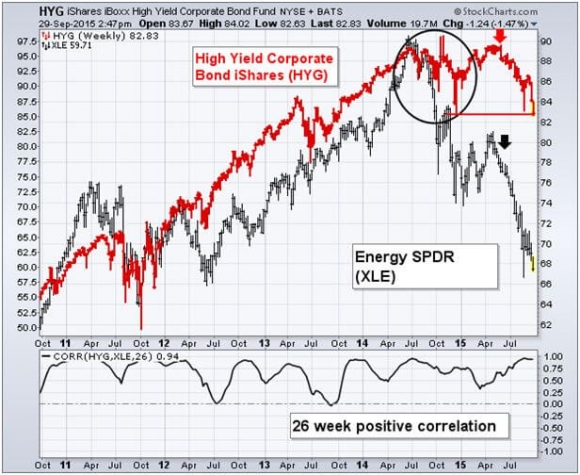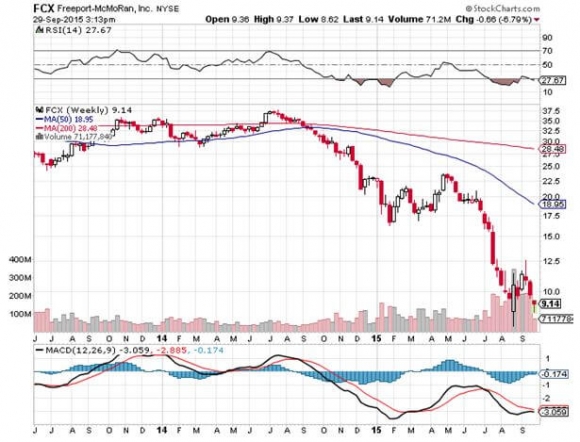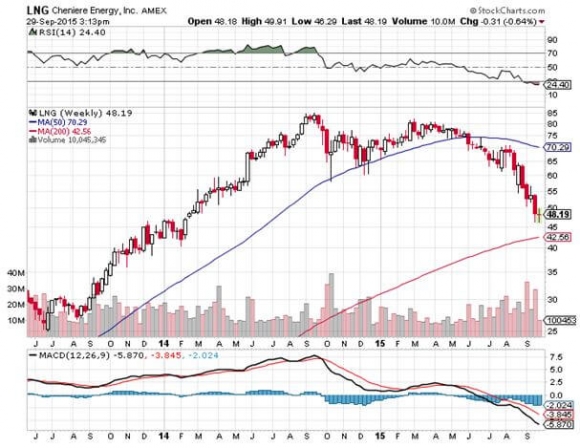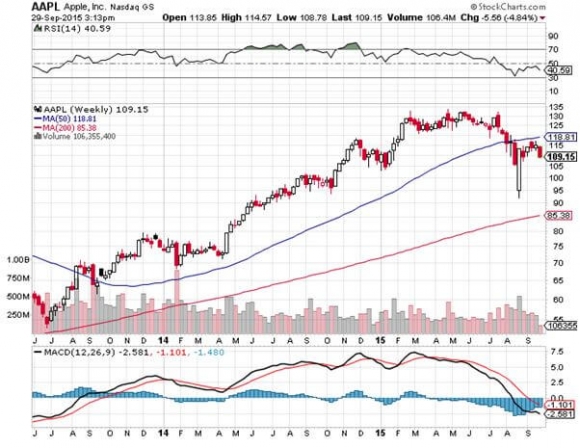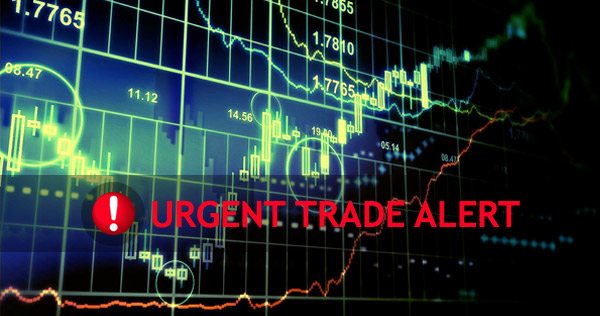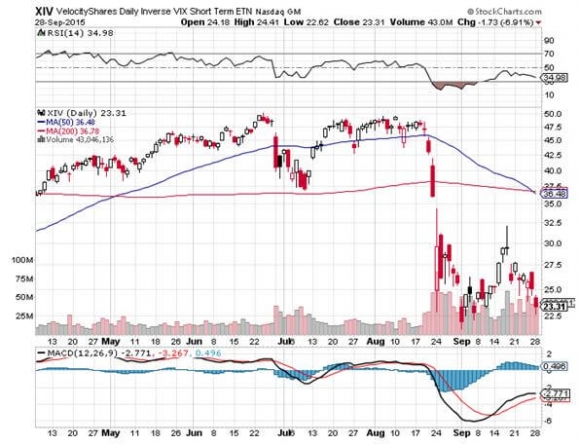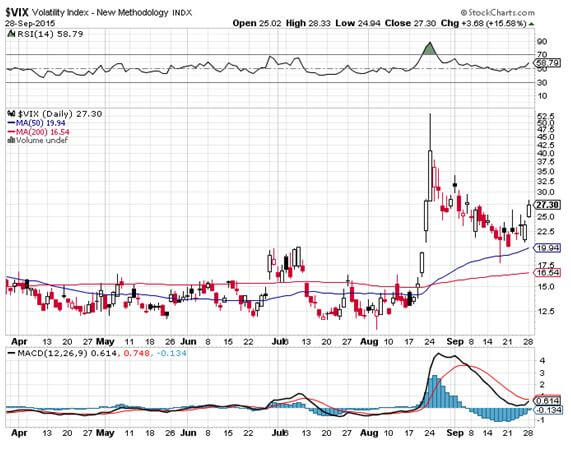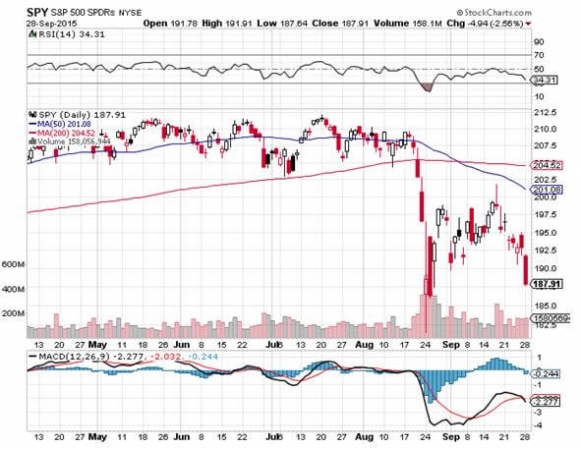While the Diary of a Mad Hedge Fund Trader focuses on investment over a one week to six-month time frame, Mad Day Trader, provided by Bill Davis, will exploit money-making opportunities over a brief ten minute to three day window. It is ideally suited for day traders, but can also be used by long-term investors to improve market timing for entry and exit points. Read more
Global Market Comments
September 30, 2015
Fiat Lux
Featured Trade:
(OCTOBER 12 PORTLAND, OREGON GLOBAL STRATEGY LUNCHEON),
(CARL ICAHN IS AT IT AGAIN),
(LNG), (FCX), (AAPL), (HYG), (JNK),
(SIGN UP NOW FOR TEXT MESSAGING OF TRADE ALERTS)
Cheniere Energy, Inc. (LNG)
Freeport-McMoRan Inc. (FCX)
Apple Inc. (AAPL)
iShares iBoxx $ High Yield Corporate Bd (HYG)
SPDR Barclays High Yield Bond ETF (JNK)
Many ascribe Monday?s 312 point plunge in the Dow Average to an informational webinar posted by legendary corporate raider and hedge fund manager, Carl Icahn.
I have known Carl for 30 years, and I once owned and apartment in his building on the Upper East Side of Manhattan, near Sutton Place (which I later sold for a quick double).
Even then, he was opinionated, cantankerous, and never hesitated to make the bold move. Wall Street hated him.
At 79, he is nothing less than a force of nature. Whenever I see Carl, I say I want to be like him when I grow up.
I just watched the controversial video, entitled ?Danger Ahead ? A Message From Carl Icahn?, which has ruffled more than a few feathers in the establishment. But that has always been Carl?s strong suite.
Here are the high-points:
1) We should end the ?carried interest? treatment of hedge fund profits, which lets billionaire managers get off scot-free, while sticking a big tax bill with the little guy.
2) Foreign profits of US multinationals, some $2.2 trillion, should be brought home, taxed, and put to work.
3) Corporate inversions, whereby American companies reincorporate overseas to beat taxes, should be banned.
4) Corporate share buybacks, which amount to 4.5% of the outstanding float per year, are a short-term fix for company share prices only at the long-term price of a weaker balance sheets.
5) Some $4.5 trillion in borrowing by the Federal Reserve has crowded out the little guy. On this one, I disagree with Carl. With overnight rates at zero and ten year Treasury bonds yielding 2.06%, nobody is getting crowded out from anything.
6) Artificially low interest rates are fueling an unwarranted takeover boom and encouraging risky financial engineering.
7) Junk bonds (HYG), (JNK) are a bubble begging to pop. They are the result of a runaway Wall Street selling machine that saw big firms selling short their own issues to unwary customers.
Carl sums up by saying that while the Fed saved the US economy during 2008-09, they created the problem in the first place with Greenspan?s excessive easing in 2002-03.
He believes that the candidacy of outsider Donald Trump is a natural reaction to peoples? dissatisfaction with Washington and Wall Street.
I have to admit that Carl has brought up some serious points here. I agree with all, except the above-mentioned ?crowding out? issue. Combined, they are a detrimental tax on the long-term economic health of America.
Could this be an attempt by Carl to throw his hat into the political ring? Treasury Secretary in a future Trump administration was mentioned in later media interviews.
But at his age, even for Carl, that would be a reach.
While Icahn has been ringing the alarm bell on the stock market and junk bonds all year, he has been aggressively acquiring major stakes in in the energy and commodities sectors all year, while they are trading at generational lows.
He has zeroed in on two of my own favorite trades, Freeport McMoRan (FCX) and Cheniere Energy (LNG).
Carl is also holding a major position in Apple (AAPL), which he acquired two years ago just after I jumped in at $395. He believes the shares are absurdly cheap.
To watch the 15 minute video in full, please click: http://carlicahn.com.
Good for you, Carl Icahn!
?Those who do not learn from history are doomed to repeat it, and I?m afraid we?re going down that road,? said corporate raider Carl Icahn.
As a potentially profitable opportunity presents itself, John will send you an alert with specific trade information as to what should be bought, when to buy it, and at what price. Read more
As a potentially profitable opportunity presents itself, John will send you an alert with specific trade information as to what should be bought, when to buy it, and at what price. This is your chance to ?look over? John Thomas? shoulder as he gives you unparalleled insight on major world financial trends BEFORE they happen. Read more
As a potentially profitable opportunity presents itself, John will send you an alert with specific trade information as to what should be bought, when to buy it, and at what price. Read more
While the Diary of a Mad Hedge Fund Trader focuses on investment over a one week to six-month time frame, Mad Day Trader, provided by Bill Davis, will exploit money-making opportunities over a brief ten minute to three day window. It is ideally suited for day traders, but can also be used by long-term investors to improve market timing for entry and exit points. Read more
Global Market Comments
September 29, 2015
Fiat Lux
Featured Trade:
(LOADING UP ON THE (XIV),
(XIV), (VIX), (SPY),
(THE POPULATION BOMB ECHOES),
(POT), (MOS), (AGU), (WEAT), (CORN), (SOYB), (DE)
(TESTIMONIAL)
VelocityShares Daily Inverse VIX ST ETN (XIV)
VOLATILITY S&P 500 (^VIX)
SPDR S&P 500 ETF (SPY)
Potash Corporation of Saskatchewan Inc. (POT)
The Mosaic Company (MOS)
Agrium Inc. (AGU)
Teucrium Wheat ETF (WEAT)
Teucrium Corn ETF (CORN)
Teucrium Soybean ETF (SOYB)
Deere & Company (DE)
Excuse me, but am I missing something here?
Has my advanced age obscured my vision, clouded my judgment, and left me discombobulated?
These are the thoughts that kept coming to mind when I looked at the action in the Velocity Shares Daily Inverse VIX Short Term ETN (XIV) on Monday.
At the absolute bottom of the August 24 flash crash, the Volatility Index (VIX) spiked up to $53. The (XIV) cratered to $22.20, or down some 53.75% from its week earlier level.
So far, so good.
During Monday?s market meltdown, the (VIX) traded up only to $28.33, but the (XIV) nearly revisited that August $22.20 low once more.
Isn?t this supposed to be mathematically impossible?
Something is out of whack here.
Either someone has invented a new math when I wasn?t looking, or these securities are mispriced.
Either the (VIX) is overbought, or the (XIV) is oversold. Given the humongous 50 point dive in the S&P 500 on Monday, I vote for the latter.
Whenever I see something artificially undervalued, I am inclined to don my ?BUY? hat. So I am committing 10% of my portfolio to a new position in the (XIV).
I have to admit that I am somewhat prejudiced when it comes to the (XIV), as I have had three profitable round trips with this baby in September.
It?s like the hot new girlfriend that falls in love with you, then dumps you?.three times in one week.
Besides, what else is there to buy?
I am still expecting a major league puke out in stocks in October, if not a full fledged crash. So, it?s way to early to start picking up bull call options spreads in single names, even the best ones.
So that leaves me with trading bullish and bearish vertical call and put options spreads in the S&P 500, which with this elevated volatility, I am pursuing with a vengeance on a daily basis.
And then there?s the (XIV).
Trading volatility can be a tricky animal. But if you get it right, you can make a fortune. This is why about half the Chicago traders still in business make a full time living trading just the (VIX).
You can pay all the way up to $24 for the (XIV) Exchange Traded Note and it still makes sense.
THIS THING WAS TRADING AT AN EYE POPPING $32.50 ONLY 10 DAYS AGO!
I?m betting that sometime in my life, the Volatility Index (VIX) will trade below today?s $28.33 high. In fact, I expect it to trade back to the mid teens within the next month.
If I am right, this position should increase in value by 50% when that happens.
If I am wrong, and the (VIX) trades higher than $53 in October, it will be only by a couple of points and for a couple of days. Like the hydrogen-7 isotope, (VIX) spikes tend to have a very short half-life (21 X 10 -24 seconds).
To make it easy for you, I am avoiding the 2X and 3X short volatility ETN?s out there, as well as the options market. That way, you don?t have to fight against the clock, and keep your partner awake all night tossing and turning.
The natural state is for volatility to fall over time, which it spends 90% of every year doing.
The current 30-day historic volatility for the S&P 500 is a hefty 27%. But a month ago, it was 18.51%, and at one point in the past twelve months, it fell as low as 3.03%.
So we are definitely at the very high end of the range. In other words, we are in fertile shorting territory.
The CBOE Volatility Index (VIX) is a measure of the implied volatility of the S&P 500 stock index.
You may know of this from the many clueless talking heads on TV, beginners, and newbies who call this the ?Fear Index?.
For those of you who have a PhD in higher mathematics from MIT, the (VIX) is simply a weighted blend of prices for a range of options on the S&P 500 index.
The formula uses a kernel-smoothed estimator that takes as inputs the current market prices for all out-of-the-money calls and puts for the front month and second month expiration's.
The (VIX) is the square root of the par variance swap rate for a 30 day term initiated today.
To get into the pricing of the individual (VIX) options, please go look up your handy dandy and ever useful Black-Scholes equation. You will recall that this is the equation that derives from the Brownian motion of heat transference in metals.
Got all that?
For the rest of you who do not possess a PhD in higher mathematics from MIT, and maybe scored a 450 on your math SAT test, or who don?t know what an SAT test is, this is what you need to know.
When the market goes up, the (VIX) goes down. When the market goes down, the (VIX) goes up.
End of story. Class dismissed.
The (VIX) is expressed in terms of the annualized movement in the S&P 500, which on Monday closed at 1,881.77. So a (VIX) of $28 means that the market expects the index to move 8.09%, or 152.17 S&P 500 points, over the next 30 days.
To oblige, the big cap index has to therefore stay with a 1,729.60 ? 2,033.94 range.
You get this by calculating $28/3.46 = 8.09%, where the square root of 12 months is 3.46.
The volatility index doesn?t really care which way the stock index moves. If the S&P 500 moves less than the projected 8.09% over the allotted time, you are guaranteed a profit on your long (XIV) positions.
I?m more than happy to make that bet.
I am going into this detail because I always get a million questions whenever I raise this subject with volatility-deprived investors.
After spending years stuck in in the $12-$15 range, it was nothing less than mind blowing to see it spike up to $53 August.
For a detailed description of this 1X short volatility ETN please click the link for the issuer?s website at http://www.velocitysharesetns.com/xiv.
GOOD LUCK AND GOOD TRADING!
 I Bet the Next Big Move is Down
I Bet the Next Big Move is Down
Legal Disclaimer
There is a very high degree of risk involved in trading. Past results are not indicative of future returns. MadHedgeFundTrader.com and all individuals affiliated with this site assume no responsibilities for your trading and investment results. The indicators, strategies, columns, articles and all other features are for educational purposes only and should not be construed as investment advice. Information for futures trading observations are obtained from sources believed to be reliable, but we do not warrant its completeness or accuracy, or warrant any results from the use of the information. Your use of the trading observations is entirely at your own risk and it is your sole responsibility to evaluate the accuracy, completeness and usefulness of the information. You must assess the risk of any trade with your broker and make your own independent decisions regarding any securities mentioned herein. Affiliates of MadHedgeFundTrader.com may have a position or effect transactions in the securities described herein (or options thereon) and/or otherwise employ trading strategies that may be consistent or inconsistent with the provided strategies.


